Protect Birds & Their Habitats
Birding
Protect Birds & Their Habitats
Birding
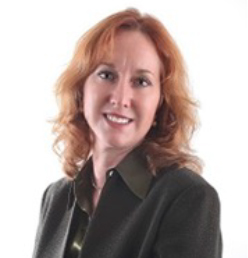
Colleen Cacy
Colleen is a partner with the firm Gadarian and Cacy, PLLC, a Tucson law firm specializing in professional Tax Strategy, Estate Planning and Asset Protection law.
• J.D. from the University of Kansas School of Law (1986)
• President of the Board of the Southern Arizona Estate Planning Council
• Elected member, American College of Trust and Estate Council
• Memberships: Executive Committee of the Probate and Trust Section of the State Bar, the State Bar of Arizona, the Probate and Trust and Tax Sections of the State Bar, the American Bar Association, and the Pima County Bar Association.
• Past President of the Board of ZUZI Dance Company
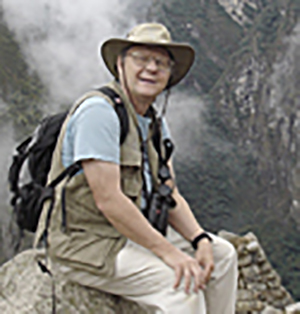
Richard Carlson
Richard started birding as a child in Minnesota 70 years ago. After a brief interlude at Harvard, where he majored in caving, mountain climbing, winter mountaineering and economics, he began birding again in Washington DC with the Maryland Ornithological Society. He was one of Chan Robbin’s volunteers in establishing the first Breeding Bird Surveys. Bribed by the Nixon administration to leave town with a fellowship to Stanford, he moved West in 1969. He worked at Stanford Research Institute, where he co-authored “Solar Energy in America’s Future” and led field trips for the Santa Clara Valley Audubon Society. He became President of the San Francisco Bay Bird Observatory and expanded his birding to Latin America. He has birded throughout the Neotropics and in Africa, Australia, Antarctica, India, China and Europe. He hopes to ultimately see at least half the birds of the world. He and his wife Pat now migrate between homes in Tucson and Lake Tahoe depending on where the birds are.
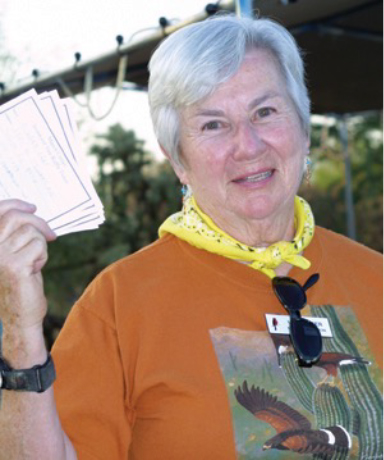
R. Cynthia Pruett
For a long period I was what you might call a “lapsed birder”. I started birding in college with a boyfriend who became my husband and we traveled all over the United States while he was in the service; leading to a pretty comprehensive bird list. Then suddenly, other life activity got in the way and for about 25 years birding was shelved. In the late 80’s I was introduced to an avid woman birder at an environmental conference and the passion came back. My work career involved many executive jobs, some of them key environmental positions, which only reinforced my understanding of the need to protect important habitat around the world. It’s (the birding) led to many trips to many countries, a joy of seeing both new and revisited birds and of course, to becoming active in Audubon chapters, both here and in Virginia.
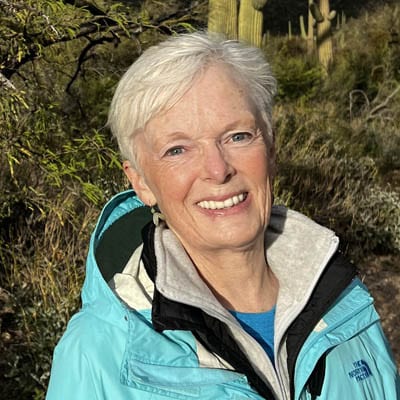
Karen Howe
Karen Howe earned a B.S. in Hydrology from the University of New Hampshire and an M.S. in Managing in Science in Technology from Oregon Health and Sciences University. Early in her career she and worked on wetlands and permafrost research in Alaska with the U.S. Army Corps of Engineers and as a hydrologist with the U.S. Forest Service. After attending Northeastern University, she worked for several companies as a technical writer and later as a director of project management, business operations, and strategic planning. Before retiring in 2021, she was an independent consultant with energy efficiency and environmental non-profit organizations guiding them in project management and strategic planning. While working, Karen lobbied extensively for federal legislation to combat climate change as a member of Citizens’ Climate Lobby. Karen visited her parents in Tucson for 25 years while living in Portland, OR and fell in love with the Sonoran Desert and the birds in the Tucson basin. In retirement, she volunteers for Tucson Audubon (trip leader, Habitat at Home), Tucson’s Mission Garden, and, during the summers, at Mt Rainier National Park. She’s an obsessive gardener, intrepid hiker, and enthusiastic bird watcher whose favorite bird is the one she’s looking at through her binoculars.
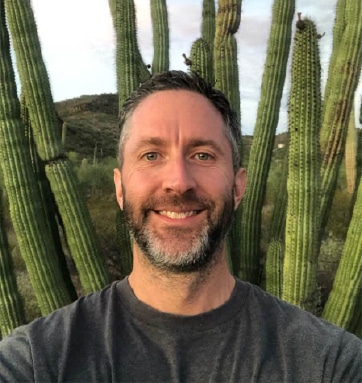
Michael T. Bogan
Michael is an Assistant Professor of Aquatic biology at the University of Arizona. Originally from California, he earned his PhD at Oregon State University, where his research focused on stream ecosystems of the Madrean Sky Islands and Sonoran Desert. He is well-known for his work on Santa Cruz River Heritage Project, and his beautiful photos of dragonflies. His research topics include Arid Lands, Conservation Biology, Invasive Species and Population and Community Ecology.
Michael serves as the faculty advisor for the UA chapter of the Society for the Advancement of Chicanos Hispanics and Native Americans in Science, a national Diversity in STEM organization. Michael is a partner on our Santa Cruz River Heritage Project work and has contributed to the Vermilion Flycatcher in the past year.
Michael has a hard time choosing a single favorite bird, but says that Curve-billed Thrashers are pretty hard to beat. “I could watch them goofing around through the leaf litter and be entertained for days!”
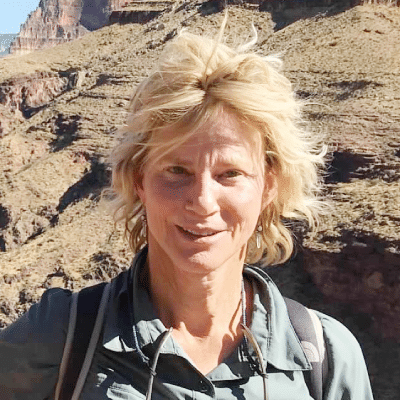
Jeanne Calhoun
Fascinated by wilderness and everything wild since growing up backpacking with her family in the Sierras,
Jeanne pursued a diverse environmental career over the past 30+ years. With a Bachelor’s in Biology
(Carleton College) and a Master’s in Geology (Oregon State University), she pursued multiple aspects of
environmental protection, with the last 23 years focused on ecological conservation in Arizona, working for
The Nature Conservancy, US Fish & Wildlife Service, and the US National Park Service. During her ten
years at TNC, Jeanne was responsible for on-the-ground conservation in four ecoregions in Arizona,
management of TNC’s preserve system, land management and restoration, government relations, and
water policy.
Most recently, she worked for Grand Canyon National Park as Chief of the Science and Resource
Management Division, where she oversaw all science research as well as natural and cultural resource
management activities in the park. During her years at the Grand Canyon, Jeanne initiated the first
Paleontological Resources Inventory for the park, led a Climate Change Analysis for the park’s watershed,
reinitiated the effort to designate 94% of the park as Wilderness, and led publication of the Natural and
Cultural Resource Condition Assessment for the park.
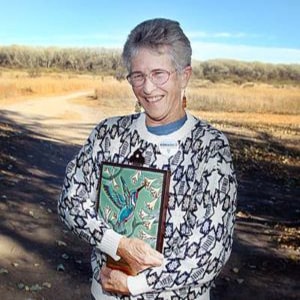
Tricia Gerrodette
Tricia never wound up with a career but instead had a variety of jobs and life experiences. She’s been a bookkeeper, a typist, a proofreader and then a test analyst for a defense contracting company. She was a tour guide for trips into Mexico’s Copper Canyon for Elderhostel (now Road Scholar). The trips focused on Mexican and railroad history as well as the history and culture of the Rarámuri (Tarahumara) natives.
Secretary of the board for Tucson Audubon, member of the board for Friends of the San Pedro River, president of the now-defunct Huachuca Audubon Society, treasurer for Sky Island Unitarian Universalist Church, Water Sentinel with Sierra Club Water Sentinels, Steering Committee for Sustainable Water Workgroup.
When Huachuca Audubon Society disbanded in May 2016, Cochise County became part of the “assigned” territory for Tucson Audubon Society. That was a huge amount of land, although not too many people, to absorb. I was invited to be on the Tucson Audubon board to help with that effort, and to help protect the San Pedro River. That work still continues!
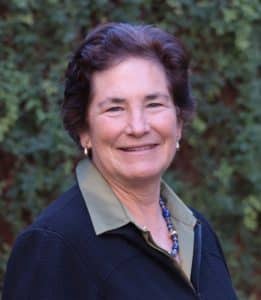
Kathy Jacobs
Kathy Jacobs is a professor of Environmental Science at the University of Arizona and Director of the Center for Climate Adaptation Science and Solutions (CCASS). CCASS is a component of the Arizona Institutes for Resilience, and builds capacity to accelerate adaptation and on-the-ground solutions to climate issues. She is currently a member of a team that is building the Indigenous Resilience Center at the UA. From 2010 – 2013, Jacobs worked in the Office of Science and Technology Policy in the White House. She was director of the Third National Climate Assessment, and the lead advisor on water science, policy, and adaptation. From 2006-2009 Jacobs was Executive Director of the Arizona Water Institute, a consortium of Arizona’s three universities focused on water sustainability. She worked 23 years for the Arizona Department of Water Resources, including 15 as the director of the Tucson Active Management Area. She was engaged in multiple aspects of implementing Arizona’s Groundwater Management Act, including development of water conservation programs and the Assured Water Supply Rules. Jacobs has served on nine National Academy panels; she earned her M.L.A. in environmental planning from Berkeley.
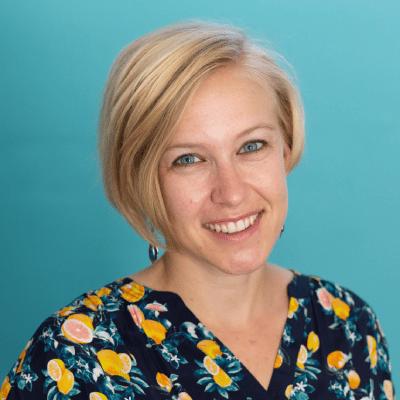
Elisabeth (Lissie) Jaquette
Elisabeth (Lissie) Jaquette had been an occasional birder prior to moving to Arizona in 2018. Since connecting with Tucson Audubon, she has become increasingly passionate about birding, and is excited to give back by serving on the board. Lissie first became involved with Tucson Audubon by participating in the Habitat at Home program, then by joining as a member, and more recently by volunteering with the Southeast Arizona Birding Festival, the Birdathon, and several bird surveys.
Lissie’s education includes a BA from Swarthmore College and an MA from Columbia University. Since 2017 she has served as Executive Director for the American Literary Translators Association, a non-profit membership organization.
When Lissie is not birding, she enjoys hiking and trail running in the Sonoran Desert, and translating literature from Arabic to English (her latest book was a finalist for the 2020 National Book Awards). She lives in Tucson with her toddler son, Cassin (named for the kingbird); and husband, Dan (sadly not named for any birds).
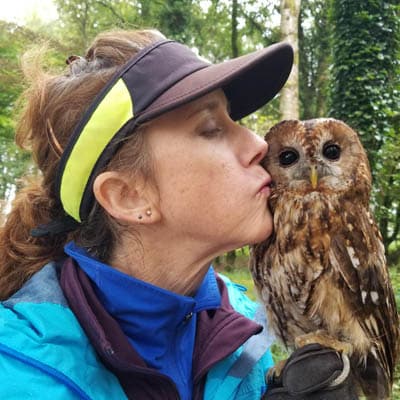
Milly Lierman
Milly grew up surrounded by bird books and comes from 2 generations of birders, most significantly her paternal grandmother. While her 30+ year engineering career and motherhood did not afford as much time to pursue her love of birds, nature, and the outdoors as much as she would have liked, she is taking the opportunity as a retiree to make up as much ground as possible. In retirement she is committed to dedicating the rest of her life to using her skills and energy to help others to rewild and steward our great planet Earth and all the wondrous life it supports. She held a number of leadership positions while working that afforded her opportunities to learn what positive, influential leadership can really look like, and is happy to be able to use those skills later in life but with a completely nature-based focus. Milly very much enjoys solving problems, digging into relevant topics and helping “plant seeds” by sharing information, new ideas, approaches, and possibilities. She also enjoys giving her time and effort to numerous volunteer organizations in both Tucson and Washington State including Native Seeds/SEARCH, Mission Garden, Tohono Chul, Tucson Audubon, Climate Reality Project, Buck Lake Native Plant Garden, Kul Kah Han Native Plant Garden, Salish Coast Elementary School/Port Townsend production garden, FoodBankGrowers.org and Admiralty Audubon. Milly is a Board Member and Sustainability Committee lead for Strauss Manor on Pantano in Tucson and a board member for Food Bank Growers in Washington State. She is a member of Arizona Native Plant Society and Washington Native Plant Society in addition to Tucson Audubon Society, Olympic Peninsula Audubon and Admiralty Audubon. She holds a Bachelor of Science in Computer and Electrical Engineering from Purdue University and a Masters of Science in Electrical Engineering from University of Arizona, both inspired by her father who was a birder, Audubon supporter, and professor of Mechanical Engineering, and the inspiration of her love of nature.